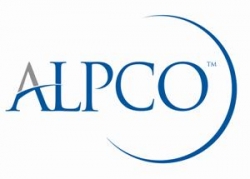U.S. Patent Granted for the Multimeric Adiponectin ELISA
A United States patent has been granted to Sekisui Medical Corp. (Tokyo, Japan), the inventors of the Multimeric Adiponectin ELISA. The Multimeric Adiponectin ELISA is distributed in the U.S. and Canada exclusively by ALPCO Diagnostics.

Salem, NH, March 23, 2010 --(PR.com)-- A growing body of research supports the use of adiponectin as an indicator of metabolic syndrome and type II diabetes progression. While type II diabetes is clinically well-characterized, metabolic syndrome is a cluster of symptoms including obesity, dyslipidemia, hypertension and insulin resistance, and although it may be a “pre-cursor” syndrome to type II diabetes and/or cardiovascular disease, much work remains to clearly elucidate its etiology.
A number of large epidemiological studies have shown that both total and high-molecular-weight (HMW) adiponectin levels are inversely related to insulin resistance, type II diabetes and metabolic syndrome. Conversely, adiponectin levels increase with weight loss and increased physical activity and in response to insulin-sensitizing therapeutics like the TZD class of drugs. Interestingly, many of these studies suggest that HMW adiponectin and the ratio of HMW to total adiponectin (HMWR) may be more informative than total adiponectin alone.
Commercial methods for adiponectin quantification are widely available; however few are designed for detection of HMW adiponectin, specifically. In fact, ALPCO Immunoassays (Salem, NH) offers the only commercial immunoassay, the Multimeric Adiponectin ELISA, that affords simultaneous measurement of HMW and total adiponectin (for research use only). The developers of the Multimeric Adiponectin ELISA, Sekisui Medical Co. (Tokyo, Japan), were recently awarded a U.S. patent that governs all novel aspects of the methodology, particularly the protease pre-treatment of samples.1 The patent also covers further applications of the method, including the determination of HMW, hexameric, and trimeric adiponectin, as well as assignation of the relative ratios to total adiponectin, including HMWR.
Before the advent of the Multimeric Adiponectin ELISA, differences in calibration across kits contributed to inaccurate determination of the HMWR. With measurement of both total and HMW adiponectin in the same assay, the HMWR can now be reported with confidence. In light of the fact that there is no international reference standard for adiponectin, the emergence of the ALPCO/Sekisui ELISA as a recognized method for adiponectin measurement will not only improve comparative capabilities across laboratories, but it may pave the way towards clinical utility as well.
1) US Patent No. 7608405B2; Iss. 27 Oct. 2009
###
A number of large epidemiological studies have shown that both total and high-molecular-weight (HMW) adiponectin levels are inversely related to insulin resistance, type II diabetes and metabolic syndrome. Conversely, adiponectin levels increase with weight loss and increased physical activity and in response to insulin-sensitizing therapeutics like the TZD class of drugs. Interestingly, many of these studies suggest that HMW adiponectin and the ratio of HMW to total adiponectin (HMWR) may be more informative than total adiponectin alone.
Commercial methods for adiponectin quantification are widely available; however few are designed for detection of HMW adiponectin, specifically. In fact, ALPCO Immunoassays (Salem, NH) offers the only commercial immunoassay, the Multimeric Adiponectin ELISA, that affords simultaneous measurement of HMW and total adiponectin (for research use only). The developers of the Multimeric Adiponectin ELISA, Sekisui Medical Co. (Tokyo, Japan), were recently awarded a U.S. patent that governs all novel aspects of the methodology, particularly the protease pre-treatment of samples.1 The patent also covers further applications of the method, including the determination of HMW, hexameric, and trimeric adiponectin, as well as assignation of the relative ratios to total adiponectin, including HMWR.
Before the advent of the Multimeric Adiponectin ELISA, differences in calibration across kits contributed to inaccurate determination of the HMWR. With measurement of both total and HMW adiponectin in the same assay, the HMWR can now be reported with confidence. In light of the fact that there is no international reference standard for adiponectin, the emergence of the ALPCO/Sekisui ELISA as a recognized method for adiponectin measurement will not only improve comparative capabilities across laboratories, but it may pave the way towards clinical utility as well.
1) US Patent No. 7608405B2; Iss. 27 Oct. 2009
###
Contact
ALPCO Diagnostics
Kate Kaplan
1-603-893-8914 x220
www.alpco.com
Kate Kaplan
1-603-893-8914 x220
www.alpco.com
Categories
